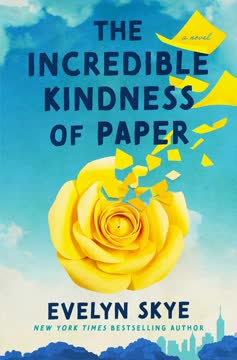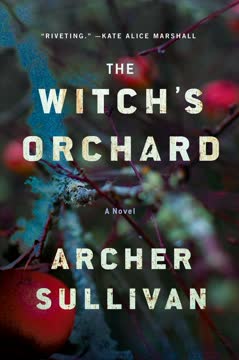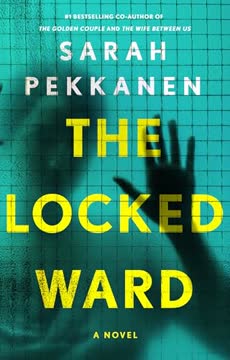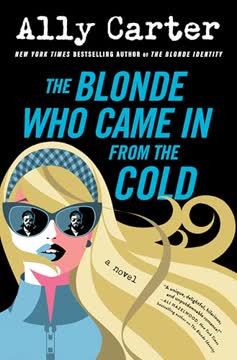Plot Summary
Whispered Wishes on Paper
Chloe Hanako Quinn, a sensitive and imaginative girl in Kansas, discovers her unique way of connecting with the world: she whispers her deepest hopes and stories into pieces of paper. Her first pen pal letter, sent to a boy named Oliver, is more than a simple introduction—it's a secret wish for friendship and belonging. This act of vulnerability, sealed with a kiss, sets the tone for a lifelong yearning for connection. The magic of Chloe's words, though unremarkable to others, resonates with Oliver, who senses the unspoken truths within her letter. Their childhood bond, forged through these intimate exchanges, becomes a lifeline for both, especially as Chloe battles loneliness and dreams of a friend who truly understands her.
The Kindness of Yellow Roses
Years later, Chloe is a high school guidance counselor in New York, known for her origami yellow roses—each containing a handwritten message of encouragement. She gives these to students like Xander, who struggle with anxiety and self-doubt. Chloe's roses become tokens of hope, small acts of kindness in a city that often feels cold and indifferent. But when she's abruptly laid off due to budget cuts, Chloe's sense of purpose is shaken. The yellow roses, once symbols of her connection to others, now become her own source of comfort as she faces uncertainty, isolation, and the daunting prospect of starting over in a city that seems to have no place for her softness.
Losses and New Beginnings
Chloe's world unravels: she loses her job, her sense of belonging, and the daily connections that gave her life meaning. Her roommate Becca, brash but caring, tries to toughen her up, while Chloe's boyfriend Zac offers support but doesn't fully understand her need for gentle connection. In her lowest moments, Chloe turns to her family in Kansas for comfort, but distance and adulthood make it hard to recapture the warmth of home. Yet, in the midst of despair, Chloe's habit of folding and leaving yellow paper roses around the city begins to ripple outward, touching strangers in unexpected ways. The simple act of kindness starts to weave a new, fragile web of community around her.
City of Strangers
New York's relentless pace and anonymity amplify Chloe's loneliness. She observes the city's indifference—people lost in their phones, doors not held, kindnesses withheld. Her own need for connection becomes acute, and she clings to small rituals: texting Zac, calling her parents, folding roses. Meanwhile, Oliver, now a successful but emotionally guarded quant at a hedge fund, navigates his own isolation. He's haunted by the memory of Chloe, the only person who ever truly saw him, and by the wounds left by his mother's betrayals. Their parallel lives in the city, both marked by longing and the search for meaning, set the stage for a fateful reconnection.
The Return of Old Friends
A series of serendipitous meetings brings Chloe and Oliver back into each other's orbit, though neither immediately recognizes the other. Their encounters are awkward, charged with unspoken history and the ache of what was lost. Chloe, still reeling from her job loss, finds solace in her growing network of paper rose volunteers—elderly sisters, a dog-walking neighbor, a kind driver—all drawn together by her quiet acts of kindness. Oliver, meanwhile, is drawn to Chloe's warmth but is afraid to reveal his true identity, burdened by guilt over his abrupt disappearance years ago. The city, once a place of strangers, becomes a web of interconnected lives, all touched by Chloe's roses.
Origami and Serendipity
Chloe's yellow roses begin to work a quiet magic across New York. A lonely elderly woman finds hope in a message that echoes her late husband's words. A struggling baker is inspired to keep his business afloat. A city worker, feeling invisible, is reminded that his small efforts matter. Each story, connected by the thread of Chloe's kindness, demonstrates the power of small gestures to change lives. The roses become a phenomenon, spreading joy and connection in a city starved for both. Chloe, still unsure of her own future, finds purpose in this accidental movement, even as she grapples with her own heartbreak and uncertainty.
Messages That Find Us
A mysterious correspondence begins: Chloe and an anonymous skeptic exchange messages via a single gold-striped paper rose that keeps returning to her, no matter where it's left. The notes, at first playful and then deeply personal, become a lifeline for both. They debate hope, risk, and the possibility of healing. Unbeknownst to each other, Chloe and Oliver are the writers—each pouring their fears and dreams into the rose, each longing for connection but afraid to hope. The rose's uncanny ability to find its way back and forth becomes a symbol of fate, serendipity, and the invisible threads that bind people together.
The Paper Rose Effect
The paper rose movement explodes, spreading across the city and beyond. Volunteers join Chloe, folding and distributing roses in parks, subways, and hospitals. Stories of lives touched by the roses multiply: a cancer patient finds strength, a lonely immigrant driver rediscovers his voice, a community rallies to save a neighbor from eviction. The media takes notice, and Chloe is thrust into the spotlight, her project hailed as a beacon of hope in troubled times. Yet, with attention comes pressure: Zac urges her to monetize, the world wants to brand her kindness, and Chloe must decide what she truly values.
Past Lives, Present Hearts
As Chloe's and Oliver's lives intertwine, the past resurfaces. Flashbacks reveal their childhood bond, the trauma of Oliver's family fleeing in the night due to his mother's crimes, and the heartbreak of their sudden separation. Both carry scars: Chloe's from abandonment, Oliver's from shame and distrust. Their adult selves struggle to reconcile who they were with who they've become. The anonymous paper rose correspondence deepens, each message peeling back layers of pain and hope. When they finally recognize each other, the reunion is fraught with longing, regret, and the question of whether love can survive so many years and so much hurt.
The Rooftop Reunion
At a glittering gala, Chloe and Oliver's true identities are revealed. Their chemistry reignites, but so do old wounds and new complications—Zac's jealousy, Oliver's guilt, Chloe's uncertainty. A confrontation on a rain-soaked rooftop brings everything to a head: confessions, accusations, and a physical fight between the rivals. Chloe, torn between past and present, must choose not just between two men, but between safety and risk, forgiveness and self-protection. The storm outside mirrors the emotional tempest within, as Chloe and Oliver stand on the precipice of either repeating old patterns or forging a new future.
Truths Unfolded
The aftermath of the rooftop confrontation forces Chloe and Oliver to confront the truth. Oliver, finally, tells Chloe the full story of his family's flight, his mother's betrayals, and his own shame and fear. Chloe, in turn, faces her own patterns of self-sacrifice and the need to be seen for who she truly is. The gold-striped paper rose becomes the vessel for their most vulnerable confessions. As they exchange letters, charms, and memories, the possibility of forgiveness—and a second chance at love—emerges. But before they can move forward, they must reckon with the cost of trust and the risk of opening their hearts again.
The Cost of Trust
Just as Chloe dares to hope, she is betrayed by Oliver's mother, who cons her out of her savings meant for a new nonprofit. The loss is devastating, compounding Chloe's financial and emotional struggles. Oliver, learning of his mother's actions, is wracked with guilt and shame, forced to confront the legacy of hurt she's left in both their lives. Chloe returns home to Kansas, seeking solace and clarity among her family. The distance gives both time to reflect on what truly matters, and whether the risk of loving again is worth the pain of past betrayals.
Healing and Forgiveness
In Kansas, surrounded by family and the rituals of home, Chloe begins to heal. She revisits the memory box of her life with Oliver, sifting through the artifacts of their shared past. Meanwhile, Oliver, with the help of his own family, comes to terms with his mother's actions and his own need for forgiveness. He takes concrete steps to make amends, helping to establish the nonprofit Chloe dreamed of. Through a series of heartfelt letters—now delivered via a cascade of paper roses—Oliver lays bare his soul, apologizing for the past and offering his heart anew. Chloe, moved by his vulnerability, finds the courage to forgive and to hope again.
The Power of Small Things
The paper rose movement, born of Chloe's small acts of kindness, becomes a global phenomenon. The roses, and the stories they carry, inspire people across cities and continents to reach out, connect, and care for one another. Chloe's vision of a world made better by small gestures is realized—not through fame or profit, but through the quiet, persistent power of hope. The narrative celebrates the ripple effect of goodness, the way a single act can change a life, a community, and even the world. Chloe and Oliver, having found their way back to each other, become living proof that healing and connection are possible, even after great loss.
Coming Home to Each Other
Chloe returns to New York, determined to find Oliver and claim the future they were denied. Their reunion, set against a backdrop of thousands of yellow paper roses, is both ordinary and extraordinary—a testament to the power of persistence, forgiveness, and love. They exchange tokens from their past, make new wishes, and finally allow themselves to believe in a happily ever after. The city that once felt cold and indifferent is transformed by their story, a place where kindness and connection are possible. Chloe and Oliver, at last, come home to each other, their hearts mended and open to the infinite.
Infinite Hearts, Infinite Hope
The story closes with Chloe and Oliver embracing the future together, their love symbolized by the infinity charm and the endless chain of paper roses. Their journey—from childhood friends to lost loves to reunited soulmates—serves as a reminder that hope is never wasted, that kindness matters, and that even the most broken hearts can heal. The paper roses continue to spread, carrying messages of encouragement and joy to strangers around the world. Chloe and Oliver's story becomes a legend, not because of grand gestures, but because of the quiet, persistent power of believing in each other, in love, and in the incredible kindness of paper.
Characters
Chloe Hanako Quinn
Chloe is the emotional center of the story—a woman whose kindness is both her strength and her vulnerability. Raised in Kansas, she is shaped by a loving family and a deep sense of empathy, but also by loneliness and the ache of being misunderstood. As an adult, Chloe channels her longing for connection into her work as a guidance counselor and, later, into the creation of yellow origami roses, each bearing a message of hope. Her journey is one of loss and rediscovery: losing her job, her sense of purpose, and her first love, only to find new meaning in small acts of kindness. Chloe's relationships—with her students, her family, her friends, and especially Oliver—reveal her capacity for forgiveness and her belief in the power of hope, even when the world seems indifferent. Her development is marked by a growing confidence in her own worth and the realization that she deserves to be seen, chosen, and loved for who she truly is.
Oliver James Jones
Oliver is Chloe's childhood best friend and first love, a mathematical prodigy whose life is upended by his mother's criminal schemes. Forced to flee Kansas as a teenager, Oliver is shaped by trauma, shame, and a deep-seated fear of vulnerability. As an adult, he becomes a successful but emotionally guarded quant in New York, hiding behind logic and numbers to protect himself from further hurt. His reunion with Chloe reawakens old wounds and longings, forcing him to confront the pain of abandonment and the possibility of forgiveness. Oliver's journey is one of gradual opening: from skepticism and self-protection to risk and hope. His anonymous correspondence with Chloe via the paper roses becomes a safe space for honesty, and ultimately, a path to healing. His character arc is defined by the struggle to believe in love again, to make amends for the past, and to accept that he is worthy of happiness.
Zac Billings
Zac is Chloe's British boyfriend—a suave, driven investment banker whose worldview is shaped by ambition and the pursuit of success. He is generous and attentive in his own way, but his love language is achievement and acquisition, not the quiet, persistent kindness that defines Chloe. Zac's relationship with Chloe is marked by misunderstanding: he admires her, but cannot fully grasp her need for gentleness and authenticity. His rivalry with Oliver, both professional and romantic, brings out his competitive side, but also reveals his limitations as a partner for Chloe. Ultimately, Zac's arc is one of acceptance—recognizing that love cannot be won by force or strategy, and letting go with grace.
Becca Huntington
Becca is Chloe's roommate and self-appointed big sister—a no-nonsense New Yorker who believes in rules, order, and tough love. She is brash and sometimes abrasive, but her care for Chloe is genuine. Becca's role is to challenge Chloe's softness, pushing her to stand up for herself and navigate the harsh realities of city life. Their relationship is a mix of sibling-like bickering and deep loyalty, providing Chloe with both grounding and a mirror for her own growth. Becca's skepticism about Zac and her support during Chloe's lowest moments highlight the importance of chosen family.
Jennifer Jones
Jennifer is Oliver's mother—a sociopath whose charm masks a history of cons, betrayals, and emotional damage. Her actions are the catalyst for much of the story's pain: forcing her family to flee, shattering Oliver's trust, and later, inadvertently betraying Chloe. Jennifer's character is complex: she is not wholly evil, but deeply flawed, capable of both love and harm. Her arc is one of failed redemption—she tries, in her own misguided way, to help Chloe, but ultimately cannot escape her own patterns. Jennifer's presence looms over Oliver's life, shaping his fears and his struggle to believe in goodness.
Thelma "Threadbare Countess"
Thelma is an elderly neighbor in Chloe's apartment building, initially gruff and isolated. A chance encounter with one of Chloe's paper roses—bearing a message that echoes her late husband's words—becomes a turning point. Inspired, Thelma starts a doggy daycare, finds renewed purpose, and becomes a pillar of her community. Her story exemplifies the ripple effect of small kindnesses and the possibility of new beginnings at any age.
Bonnie and Mary
Bonnie and Mary are white-haired sisters and former flight attendants who become Chloe's first volunteers in the paper rose movement. Their enthusiasm, humor, and willingness to connect with strangers help transform Chloe's solitary project into a communal effort. They represent the wisdom and joy of intergenerational friendship, as well as the importance of human connection in combating loneliness.
Ricky
Ricky is a Colombian immigrant and car service driver, once a chemist, who feels unseen in New York. A paper rose left in his car inspires him to re-engage with his passengers and reclaim his sense of agency. Ricky's story highlights the struggles of immigrants, the pain of invisibility, and the power of small gestures to restore dignity and hope.
Giovanni
Giovanni is an Italian baker whose business is failing until a paper rose with a timely message gives him the courage to adapt and persevere. His story, intertwined with Chloe's and Oliver's, demonstrates the practical impact of kindness and the interconnectedness of community.
Xander
Xander is a first-generation college hopeful and one of Chloe's students. Her encouragement and the gift of a yellow rose help him overcome self-doubt and embrace his future. Xander's journey mirrors Chloe's own: the need for support, the fear of not belonging, and the transformative power of being seen and believed in.
Plot Devices
The Traveling Paper Rose
The gold-striped origami rose serves as both a literal and metaphorical device, carrying messages between Chloe and Oliver across time and space. Its uncanny ability to return, regardless of where it's left, blurs the line between coincidence and fate, suggesting a kind of magic rooted in intention and longing. The rose becomes a vessel for vulnerability, allowing both characters to express truths they cannot say aloud. It also functions as a narrative thread, tying together disparate storylines and characters, and symbolizing the persistence of hope and the possibility of reunion. The rose's journey mirrors the emotional arc of the protagonists: from skepticism and guardedness to risk, forgiveness, and love.
Dual Timelines and Flashbacks
The novel employs a structure that alternates between Chloe and Oliver's present-day struggles and their shared past. Flashbacks to childhood, adolescence, and the trauma of separation provide context for their adult fears and desires. This device deepens the reader's understanding of their bond, the pain of their loss, and the stakes of their reunion. The gradual revelation of secrets—why Oliver disappeared, the truth about his mother, the contents of the memory box—builds suspense and emotional payoff.
Serendipity and Interconnectedness
The story is rich with moments of serendipity: chance meetings, roses finding their way to those who need them, strangers becoming friends. These coincidences are not merely plot conveniences, but thematic affirmations of the novel's belief in the invisible threads that connect people. The city, initially a place of isolation, is transformed into a web of relationships, each touched by kindness. This device reinforces the message that small actions can have far-reaching consequences, and that no one is truly alone.
Letters and Messages
The exchange of letters—first as children, then as anonymous adults via the paper rose—serves as a safe space for honesty and vulnerability. The written word allows Chloe and Oliver to articulate feelings they cannot voice, to test the waters of hope and forgiveness. This device also creates dramatic irony, as the reader knows (or suspects) the true identities of the correspondents before the characters do, heightening anticipation and emotional investment.
Symbolism of Origami and Infinity
Origami, with its delicate folds and hidden messages, symbolizes the complexity of human emotion and the possibility of transformation. The infinity charm, exchanged as a token of love, represents the enduring nature of Chloe and Oliver's bond, even through years of separation and pain. These symbols anchor the story's themes of hope, resilience, and the belief that love, like paper, can be fragile yet enduring.
Analysis
The Incredible Kindness of Paper is a luminous meditation on the power of small acts to change lives, the necessity of vulnerability, and the redemptive potential of love. In an age marked by cynicism, loneliness, and transactional relationships, the novel insists that gentleness is not weakness, and that hope is not naïveté but a radical act of faith. Through Chloe's journey—from heartbreak and loss to the creation of a global movement—the story demonstrates that meaning is found not in grand gestures or public acclaim, but in the daily, persistent choice to care. Oliver's arc, from wounded skeptic to open-hearted lover, affirms that healing is possible, but only when we risk being seen and forgiven. The paper roses, both magical and mundane, are a metaphor for the ways we touch each other's lives, often without knowing it. The novel's lesson is clear: kindness is contagious, connection is essential, and even the most broken hearts can be mended—one message, one rose, one act of hope at a time.
Last updated:
Review Summary
The Incredible Kindness of Paper is a heartwarming story about spreading kindness through origami roses. Readers praise its uplifting message, magical realism elements, and sweet romance between childhood friends Chloe and Oliver. Many found it a comforting read, likening it to a "warm hug." Some critics felt the plot was unrealistic or overly sentimental. The book explores themes of hope, second chances, and the power of small acts of kindness. Most reviewers recommend it for those seeking a feel-good, light read with a positive message.
Similar Books
Download PDF
Download EPUB
.epub digital book format is ideal for reading ebooks on phones, tablets, and e-readers.








